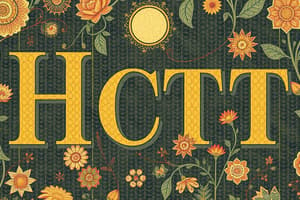Podcast
Questions and Answers
What are the consequences of plagiarism?
What are the consequences of plagiarism?
- Loss of credibility (correct)
- Enhanced credibility
- Monetary rewards
- Legal protection
How can plagiarism be prevented?
How can plagiarism be prevented?
- Using others' work without credit
- Copying without quotation marks
- Ignoring sources of information
- Acknowledging sources (correct)
What is a key difference between academic and creative writing?
What is a key difference between academic and creative writing?
- Storytelling is more vital in academic writing
- Academic writing follows specific citation rules (correct)
- Grammar is not important in academic writing
- Character development is key in academic writing
Why is it important to understand the differences between writing conventions?
Why is it important to understand the differences between writing conventions?
What is essential for effective written communication according to the text?
What is essential for effective written communication according to the text?
Why are grammar and punctuation important in writing?
Why are grammar and punctuation important in writing?
What is the purpose of style guides and formatting conventions?
What is the purpose of style guides and formatting conventions?
Why is correct spelling important in writing?
Why is correct spelling important in writing?
Which of the following is NOT part of style guides and formatting conventions?
Which of the following is NOT part of style guides and formatting conventions?
How does plagiarism affect a writer's credibility?
How does plagiarism affect a writer's credibility?
What role do commas, periods, question marks, and exclamation points play in writing?
What role do commas, periods, question marks, and exclamation points play in writing?
Flashcards are hidden until you start studying
Study Notes
Writing Conventions
Writing conventions refer to the standardized rules and practices followed by writers when producing written works. These guidelines ensure clarity, coherence, and accuracy of communication across various forms of writing. In this article, we will explore some key writing conventions and their importance.
Grammar and Punctuation
Grammar and punctuation are fundamental elements of writing conventions. They help convey meaning accurately and efficiently. For instance, proper grammar usage ensures that sentence structures are correctly formed, while punctuation marks like commas, periods, question marks, and exclamation points aid in conveying tone and pauses within sentences.
Style Guides and Formatting
Style guides and formatting conventions dictate how written materials should appear visually. This includes factors such as font choice, line spacing, headings, bullet points, numbered lists, indentations, capitalization, and page numbers. Adhering to these conventions helps maintain consistency and professionalism in any text.
Spelling and Vocabulary
Correct spelling is crucial for clear communication. It ensures that words are understood by the reader and helps avoid confusion. Additionally, using appropriate vocabulary tailored to your audience enhances comprehension and engagement with your writing.
Plagiarism
Plagiarism refers to presenting someone else's work as your own without proper attribution. It is considered unethical and can lead to severe consequences such as loss of credibility or even legal action. To prevent plagiarism, always acknowledge sources of information, use quotation marks when directly borrowing from others, and paraphrase ideas when necessary.
Writing Conventions in Different Contexts
Writing conventions vary depending on the context of the text. For example, academic writing follows specific rules regarding citations, formatting, tone, and structure compared to creative writing where storytelling and character development take precedence over grammatical correctness. Understanding these differences allows writers to adapt their style accordingly, ensuring they effectively communicate their message within the given context.
In conclusion, adhering to writing conventions is essential for effective written communication. By respecting these guidelines, we ensure our messages are conveyed accurately, efficiently, and respectfully across various forms of writing.
Studying That Suits You
Use AI to generate personalized quizzes and flashcards to suit your learning preferences.




